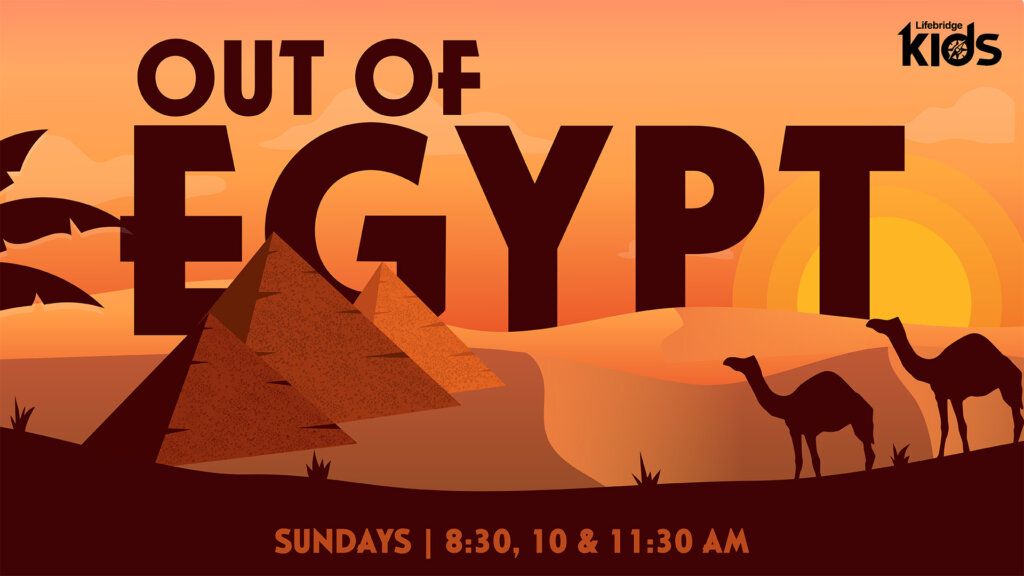
Out of Egypt
Many years had passed since God used Joseph to rescue His people from a famine by bringing them into Egypt. Now, however, God’s people were in bondage and needed to be rescued. God raised up a new rescuer, Moses, to deliver His people out of Egypt and lead them back to the promised land.
Lifebridge Kids meets every Sunday during regular Gathering Times – 8:30a, 10a or 11:30a


Sunday, April 28 // Recap
Do you know about foreshadowing? Even if you don’t know what it is, you’ve probably noticed it in your favorite books or movies. Foreshadowing is when a writer uses an event—typically early in the story—to give you a hint of something very important that will happen later in the story. Did you know that God also gave us this kind of hint in His story?
The plagues God sent on Egypt were powerful, but the tenth and final plague was the most devastating. Every firstborn son in Egypt died. However, God provided a way for the Israelites to be saved from the plague. He told them to sacrifice a lamb and place the blood of the lamb on the doorposts of their house. When God’s angel saw the blood, He would pass over the house and not bring judgment on those inside.
Can you see the foreshadowing hint that God gave us through this story? The lamb’s blood was placed vertically on the posts of the door and horizontally on the lintel of the door. The combination of these motions helps us to see the cross. Through God’s saving of the Israelites, He points us all to Jesus—the perfect Lamb who was sent to save us from sin!
Like the blood of the lamb that saved the Israelites, Jesus shed his blood for us. It is His sacrifice that allows the judgment of God to pass over all who believe. John the Baptist understood this to be true when he said, “Behold, the Lamb of God, who takes away the sin of the world!”
By His grace, God spared the Israelites from judgment by requiring the blood of a lamb. Jesus is the Lamb of God, who takes away the sin of the world. His death was the ultimate sacrifice, and those who trust in Jesus are under His saving blood and will be passed over in the final judgment.

God is not a man, that he might lie, or a son of man, that he might change His mind.
Does he speak and not act, or promise and not fulfill?
Numbers 23:19

1. Why did God send 10 plagues, instead of just the last plague?
Point out that we can’t fully understand all of God’s reasons, but the plagues were about more than just freeing His people. The plagues also demonstrated to Egypt that their false gods had no power. Even in the instances where Pharaoh’s magicians could copy God’s plagues, they could only copy it, not overcome it or undo it. God was showing His power to people who had built their entire culture on worshiping false gods.
2. Why did the Israelites have to sacrifice a lamb to be protected from the last plague?
Remind the kids that everyone is guilty of sin. Everyone deserves God’s wrath because we all rebel against Him. God’s choice to give the Israelites a way to be saved shows His mercy and love. God was also showing a beautiful picture of the way He would eventually save everyone who believes. The blood of the lamb pointed forward to Jesus, the Lamb of God who died to take away the sins of the world.
3. How does this story show God’s faithfulness to keep His promises?
God showed His faithfulness in many ways. He was faithful to pass over the houses marked by blood. He was faithful to free His people. He was faithful to judge the Egyptians for their sin. God always keeps His promises. Any time you think about a promise of God that hasn’t happened—like the promise to send Jesus again—it means He isn’t done working yet.
4. What did Pharaoh believe about God? How do our beliefs affect how we live?
Guide kids to recall that Pharaoh did not recognize God as the Lord; he did not submit to God’s authority. Discuss how our beliefs directly affect how we live. If we trust God as Lord, we will trust and follow Him even through difficult times. (Read John 16:33.)
5. What are consequences we might face when we don’t listen closely or we choose to disobey?
Lead kids to think of relational consequences with friends and family. Guide kids to consider the cost of sin in their relationships with God. Remind kids that Jesus’ sacrifice pays the cost of our sin so we can have a right relationship with God when we trust in Him. (Read John 1:29.)
6. How can we help other people recognize God if they don’t believe He is real?
Encourage kids to think of ways we can show God’s love to others. Remind kids that Pharaoh did not think he needed God, and God allowed Moses to perform miracles so that Pharaoh would recognize God’s power. Guide kids to notice that we can’t change people’s minds on our own and we need God’s help. (Read Ezek. 11:19-20.)

+ Take time this week to celebrate and remember Jesus as the sacrificial lamb who provides for our salvation.
+ Work as a family to create a poster with John 1:29 written out on it that will hang inside your front door.
+ As you pass through that doorway each day, pause to remember how God saved the Israelites and how He sent Jesus as the One who saves.
